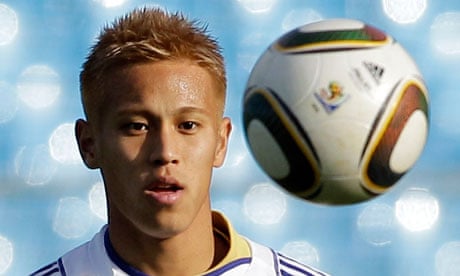There is something about the very idea of a "Japanese Maradona" that doesn't quite work. The stereotype of the people's reserve does not connect easily with the audaciousness of one of the most colourful maestros in the history of the game. Keisuke Honda has had to quietly absorb more than his fair share of hysteria in his career so far, but it is not pushing it to suggest that Diego Maradona would approve of his array of skills, and the way he is inspiring his nation.
Honda scored the winner as Japan overcame Cameroon in their opening game. That was just the warm-up. In the decisive group meeting with Denmark he pulled the strings like a virtuoso, arrowing in a fabulous free-kick and preparing the killer blow with a Cruyff turn and pass of feathered delicacy. Had he been one of the marquee names in South Africa rather than an athlete schooled in the J-League who plays his club football in Russia, his performance would have made banner headlines worldwide.
As it was fans back home in Japan, who had watched the game at 3.30am, went berserk. In Osaka, a group ran through the streets and jumped into the Dotonbori river – a traditional ritual to celebrate sporting success. In Tokyo, Shibuya's famed main intersection was taken over by a cast of thousands in Blue Samurai shirts, beating drums and chanting. They are understandably overjoyed to see Japan enter the knockout stage for the first time on foreign soil, and if they continue current form against Paraguay an historic last-eight spot is perfectly possible.
Back in George, Japan's World Cup base, their icon was greeted by supporters from the local township who sang his name, and acclaimed by the mayor, who decreed: "Honda, you're the hero of the nation of South Africa."
With his beach-blond surfer haircut and chiselled looks, Honda has already become the new face of the Japanese game. Word is spreading that they have nurtured a special talent. His ability is not exactly a secret given that he caught the eye and scored one of his trademark free- kicks in the Champions League last season for CSKA Moscow. The Russians are entitled to feel smug that they secured him on a four-year contract months before the World Cup shop window was flung open, and for only €6m (£4.9m).
They bought him from VVV Venlo, an inauspicious first stop in Europe but an invaluable one for Honda. At the age of 22 he found himself at a modest club in a small Dutch town, but it was a place that allowed him to blossom away from pressure. He immediately earned a cult following, was swiftly awarded the captaincy, and was carried shoulder high from the pitch when he guided the team to promotion. They called him "Keizer Keisuke" – Emperor Keisuke.
It is not only his technique that marks him out. He is also blessed with a ferocious work ethic and will to win. That mixture is a feature of Japan's team, who in World Cup 2010 look so much more advanced than in previous tournaments. Four years ago in Germany, they made little impression and exited without winning a game.
The current manager, Takeshi Okada, had intended a more disciplined regime than the liberal approach of Zico in 2006, but a series of awful results in the build-up to the World Cup did not augur well. At the last minute he changed his ideas, and the Japanese players have now found the platform to express their individuality within a hardworking team framework. "We have put in a great deal of effort in training so we are able to move forward very strongly when the ball is passed," explains the midfielder Yasuhito Endo.
Okada has done a sound job, but he will be stepping down after the World Cup irrespective of how far Japan go. "I'll be a farmer. When it rains, I'll read a book, and when it's fine, I'll work on the farm," he explained. Post-World Cup life promises not to be quite so simple for Honda.

Comments (…)
Sign in or create your Guardian account to join the discussion